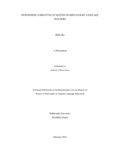
Please use this identifier to cite or link to this item:
https://hdl.handle.net/20.500.14301/504| Title: | Empowering Narratives of Maithil Women English language Teachers |
| Authors: | Jha, Bibha |
| Citation: | Jha, B.(2025). Empowering narratives of maithil women english language teachers. |
| Issue Date: | Feb-2025 |
| Publisher: | Kathmandu University School of Education |
| School: | SOED |
| Department: | DOLE |
| Level: | M.Phil. |
| Program: | Master of Philosophy (MPhil) in English Language Education |
| Abstract: | This research entitled Empowering Narratives of Maithil Women English language Teachers explores the stories of Maithil women English teachers who teach English at the secondary level in Nepal by using technology. It critically analyzed the social, cultural, and instructional narratives based on personal and professional experiences. In addition, it also sees how the knowledge and skills of English and using ICTs in teaching helped the Maithil women teachers get economically, socially, and psychologically empowered to maintain their status under the patriarchal society where men and women are treated differently and liable for different roles. I selected a narrative inquiry as a research method and used the narratives of the research participants as my research data. I selected four Maithil women teachers who teach compulsory English in grades 11 and 12 at private institutions in Nepal. My inquiry on the struggles of Maithil women teachers has explored my participants' living stories in detail, which enforce their bitter and better experiences of English language teaching in Nepal. Their stories reflect their struggles in their families, society, schools, and workplaces. Such stories also inform us how they faced challenges and raised their voices against the biases and differences applied to them at their homes and workplaces. I used empowerment theory and Sen’s capability theory, providing a theoretical foundation for this research. Based on the participants' stories, I learned that English language proficiency helped them to empower themselves in the Nepalese sociocultural context, while the knowledge and skills of ICTS in teaching empowered them in their professional arena. These skills and knowledge helped them to be established in their profession, economically uplifted, and able to handle odd situations, if any, in their life. I also learned that strong willpower and regular income motivated them throughout their academic journey. From the study, I conclude that the knowledge of English and ICT, regular income, higher education, and family support for the teaching profession are key factors in creating a democratic environment at home and in the workplace. Maithil women teachers have become powerful under society's strict social and cultural patterns. They are empowered to make their decision for their life. Furthermore, using technology in teaching has empowered them and developed their capacity to resist contradictions, make decisions, use money for them, feel powerful, and have no feeling of loss of jobs. Due to empowerment, they have earned a strong psychology to handle negative responses from family members, colleagues, or internal or external factors. In this respect, there are ample chances that they can explore the academic and professional space and height if they are motivated, encouraged, trained, and invested by a family from their childhood, as their male siblings have. In sum, family and institutional attitudes and behaviors towards Maithil women English teachers greatly impact their capability enhancement and professional achievements. |
| URI: | https://hdl.handle.net/20.500.14301/504 |
| Appears in Collections: | Dissertation |
Files in This Item:
| File | Description | Size | Format | |
|---|---|---|---|---|
| Bibha Jha final 2025.pdf | 1.18 MB | Adobe PDF |  View/Open |
Items in DSpace are protected by copyright, with all rights reserved, unless otherwise indicated.